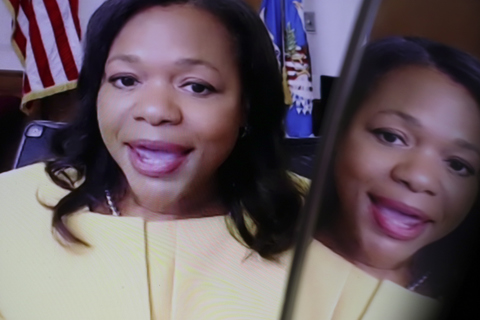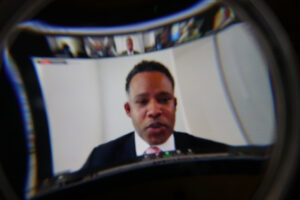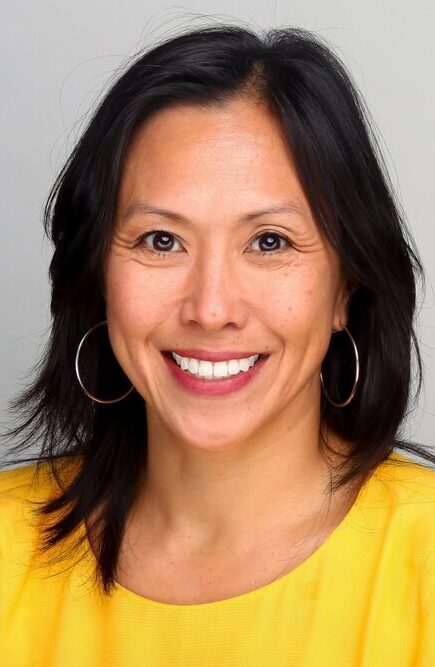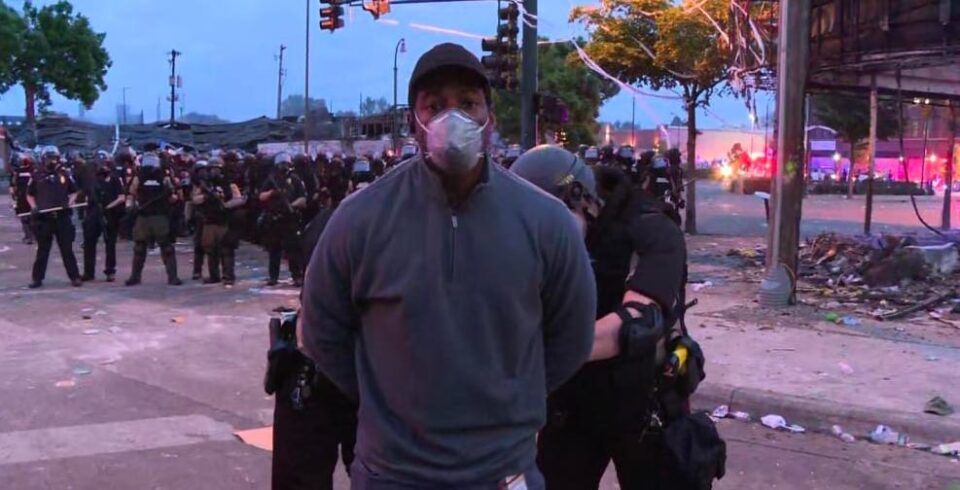DOJ Pledges to Protect the Right to Report
Oct. 15 Is Deadline to Nominate a J-Educator
Homepage photo: CNN journalist Omar Jimenez and his crew in Minneapolis arrested during a live broadcast on May 29, 2020. (screen shot)
Support Journal-ismsDOJ Pledges to Protect the Right to Report
Many a journalist felt a chill last year when Omar Jimenez, an Afro Latino CNN reporter, and his team were arrested in Minneapolis as they covered protests of the police murder of George Floyd, even after they identified themselves. The journalists were soon released, but it was far from the first time that reporters and photographers found themselves the object of police harassment.
Protecting the rights of journalists to cover protests without unwarranted police interference is one of the priorities of the Justice Department, DOJ officials told the Journal-isms Roundtable. DOJ seeks to “assure that there is legitimacy during encounters between law enforcement and officers and the community members that they serve.”
 That quotation was from Kristen Clarke (pictured), assistant attorney general for civil rights, but it was echoed by others as the department fielded six top officials to participate in the Sept. 28 Zoom call. Seventy-one people took part and 80 more watched on Facebook, with others joining after the Justice Department included the link Friday in its weekly summary.
That quotation was from Kristen Clarke (pictured), assistant attorney general for civil rights, but it was echoed by others as the department fielded six top officials to participate in the Sept. 28 Zoom call. Seventy-one people took part and 80 more watched on Facebook, with others joining after the Justice Department included the link Friday in its weekly summary.
You can watch the recording on YouTube or click further down in this column.
The DOJ officials were unified in their declarations that racial justice was a priority of the department under Attorney General Merrick Garland. They also offered, at our request, thoughts on areas of coverage where the news media could do a better job:
Those areas included empowering news consumers with knowledge of their rights and where to seek redress; follow-up stories on victims of hate crimes; recognizing the importance of antitrust prosecutions, as poor people are hurt by a lack of competition; and reporting reforms in policing around the country, which they said are taking place under the radar of many news organizations.
“I’d love to see more stories profiling success — especially successful contributions to the world from people who’ve been justice-impacted as well as programs and initiatives that work well,” added Amy L. Solomon, acting assistant attorney general for the Office of Justice Programs.
[At the following Roundtable on Oct. 7, with the authors of “Say Their Names: How Black Lives Came to Matter in America,” co-author Keith Harriston said the number of police departments undergoing reform might not be the pertinent issue.
[“Yeah, you might do that at the Justice Department, but that has no impact on what you’re doing in Sunflower, Miss.
[“. . .The Justice Department also has regulations that require police departments to report when they kill people, and most departments don’t do it and they aren’t punished for it. So, that’s a whole . . . ‘nother story . . . it’s been written about over and over again and nothing ever happens. Well, look the George Floyd Act, where is that?”]
 In addition to Clarke and Solomon, the DOJ officials were Vanita Gupta (pictured), associate attorney general; Anthony D. Coley, director, Office of Public Affairs, and senior adviser to the attorney general; Kenneth A. Polite Jr., assistant attorney general for the Criminal Division; and Ronald Davis, director, U.S. Marshals Service.
In addition to Clarke and Solomon, the DOJ officials were Vanita Gupta (pictured), associate attorney general; Anthony D. Coley, director, Office of Public Affairs, and senior adviser to the attorney general; Kenneth A. Polite Jr., assistant attorney general for the Criminal Division; and Ronald Davis, director, U.S. Marshals Service.
At least two of the most prominent — Gupta and Clarke — had been on the opposite side of the priorities of the Donald Trump Justice Department. Gupta was president and CEO of the Leadership Conference on Civil and Human Rights; Clarke was president and executive director of the Lawyers’ Committee for Civil Rights Under Law. She said at the session that she opposed mass incarceration.
“Personnel is policy,” Gupta told us, “and the values that we bring to the work that we do is what infuses our enforcement, it infuses our grantmaking, and I can say with absolute certainty, having worked with every single one of the Justice Department members on this call, that we represent a different kind of leadership, and set of values and priorities . . . in promoting equal justice and civil rights, infusing every part of the department. . . .”
On the Sunday before the Zoom, Marc Morial, CEO of the National Urban League, in an interview on MSNBC, acknowledged recent missteps by the Biden administration, but volunteered, “I give the president great marks for putting in Vanita Gupta and Kristen Clarke at the Justice Department.”
As part of his personal biography, Polite (pictured), who began as head of the criminal division a little over two months ago, told us he was born to teenage parents in New Orleans and that his half-brother was a fatal victim of street-violence at 23.

“I offer all of that background to give you a bit of perspective on how my personal and professional experiences provide me with a very fulsome, a very broad view of what justice means and what the Department of Justice can achieve, what it means to ensure diversity, equity and inclusion in our ranks and in our decision-making motions. Importantly, what it means to include justice and fairness for all who encounter our criminal justice system, whether they are victims or they are witnesses or accused,” Polite said.
Solomon, acting director of the Office of Justice Programs, said her office had more than $3 billion to offer as incentives to promote racial justice. “This morning we posted [the] W.E.B. Du Bois Fellowship for Research” on Reducing Racial and Ethnic Disparities in the Justice System, she said. “A version of this was launched 20 years ago. We revived it and put . . . funding into it.”
Gupta’s and Clarke’s comments about the First Amendment rights of journalists came as they discussed the sweeping investigations the department is undertaking of the police departments of Minneapolis, Phoenix and Louisville, Ky. On April 21, the day after the conviction of former Minneapolis officer Derek Chauvin in the murder of Floyd, acting Minnesota U.S. Attorney Anders Folk said, “This isn’t about one officer — it’s about the whole department.” The process is going to take “months and months,” so people should not expect rapid change, the Star Tribune reported at the time.
The Justice Department fielded six top DOJ officials to participate in the Sept. 28 Zoom Journal-isms Roundtable. Seventy-one people took part and 80 more watched on Facebook, with others joining after the Justice Department included the link in its weekly summary. (Credit: YouTube; Roundtable photos by Sharon Farmer/sfphotoworks)
The Justice Department promised to elaborate on the steps it is taking to protect the news media.
[Oct. 13 update: The Justice Department is appealing to journalists to contact the department with concerns about police interactions with them. See: Calif. Press Gets ‘Unfettered Access’ to Protests]
In April, the Reporters Committee for Freedom of the Press and a coalition of 91 media organizations urged Garland to investigate law enforcement’s treatment of the press as part of his department’s civil rights probes into the police departments in Minneapolis and Louisville, according to Chris Young, the Committee’s editorial coordinator.
The Fundamedios Research Project reported that “Starting in June 2020 and for 8 months, Fundamedios interviewed 115 journalists and talked with representatives of 28 organizations about the working conditions
of Latino media workers [PDF] . . . . During the first 30 days of the racial protests, in the aftermath of George Floyd’s killing the organization compiled a list of incidents involving more than 25 journalists of Latino origin. Fourteen were physically assaulted by police officers and eight were arbitrarily detained. Eight of the journalists were women,” it said.
The Roundtable did not address overall relations between the news media and the Justice Department, which through the years has been as adversarial as with any other government agency.
In July, Garland “sharply limited how and when prosecutors can secretly obtain reporters’ phone and email records, formalizing a Biden administration decree that the government would stop using secret orders and subpoenas for journalists’ data to hunt for leakers,” Devlin Barrett wrote for The Washington Post.
Yet Eleanor Eagan wrote Aug. 30 for the American Prospect, “Looking at the Justice Department’s litigation record, it has at times been easy to forget that it’s a part of the Biden administration at all. Throughout the first half of the year, in cases left over from the prior administration, the DOJ repeatedly defended Trump policies that ran directly counter to the platform on which President Biden was elected.”
Those might be topics for a future Roundtable.
Separately, the Roundtable heard from Stephanie Myers, Ph.D., of the group Black Women for Positive Change, who discussed the group’s anti-violence plans for October, suggesting that reporters address the American culture of violence and the use of de-escalation tactics.
We toasted Lee Hill, incoming executive editor of public radio’s WGBH in Boston, now known as GBH News, and Kaleb Anderson, who has been awarded the National Press Club’s 2021 Julie Schoo Scholarship for Diversity in Journalism.
- Ben Camacho and Jayrol San Jose, Poynter Institute: At police lines, not all journalists are created equal (Sept. 29)
- Wayne Dawkins, Afro: Can new Justice Department leadership clear the air?
- Randy Furst and Libor Jany, Star Tribune, Minneapolis: Minneapolis police to get training on how to intervene with fellow cops who are using excessive force (Sept. 16)
- Radio Television Digital News Association: RTDNA Endorses New Bill To Protect Journalists’ First Amendment Rights Against Government Surveillance (June 28)
- Andrew Sheller, Sacramento Bee: Gavin Newsom signs law giving journalists unrestricted access to protests closed by police (Oct. 10 update)
- Benjamin Weiser, New York Times: For the First Time in 232 Years, a Black Prosecutor Leads a Storied Office
Oct. 15 Is Deadline to Nominate a J-Educator

Mei-Ling Hopgood, 2020 recipient
Beginning in 1990, the Association of Opinion Journalists, now part of the News Leaders Association, annually granted a Barry Bingham Sr. Fellowship — actually an award — “in recognition of an educator’s outstanding efforts to encourage minority students in the field of journalism.”
Since 2000, the recipient has been awarded an honorarium of $1,000 to be used to “further work in progress or begin a new project.”
Past winners include James Hawkins, Florida A&M University (1990); Larry Kaggwa, Howard University (1992); Ben Holman, University of Maryland (1996); Linda Jones, Roosevelt University, Chicago (1998); Ramon Chavez, University of Colorado, Boulder (1999); Erna Smith, San Francisco State (2000); Joseph Selden, Penn State University (2001); Cheryl Smith, Paul Quinn College (2002); Rose Richard, Marquette University (2003).
Also, Leara D. Rhodes, University of Georgia (2004); Denny McAuliffe, University of Montana (2005); Pearl Stewart, Black College Wire (2006); Valerie White, Florida A&M University (2007); Phillip Dixon, Howard University (2008); Bruce DePyssler, North Carolina Central University (2009); Sree Sreenivasan, Columbia University (2010); Yvonne Latty, New York University (2011); Michelle Johnson, Boston University (2012); Vanessa Shelton, University of Iowa (2013); William Drummond, University of California at Berkeley (2014); Julian Rodriguez of the University of Texas at Arlington (2015) (video); David G. Armstrong, Georgia State University (2016) (video); Gerald Jordan, University of Arkansas (2017), Bill Celis, University of Southern California (2018); Laura Castañeda, University of Southern California (2019); and Mei-Ling Hopgood, Northwestern University (pictured) (2020).
Nominations may be emailed to Richard Prince, Opinion Journalism Committee, richardprince (at) hotmail.com. The deadline is Oct. 15. Please use that address only for NLA matters.
Support Journal-isms
To subscribe at no cost, please send an email to journal-isms+subscribe@groups.io and say who you are.
Facebook users: “Like” “Richard Prince’s Journal-isms” on Facebook.
Follow Richard Prince on Twitter @princeeditor
Richard Prince’s Journal-isms originates from Washington. It began in print before most of us knew what the internet was, and it would like to be referred to as a “column.” Any views expressed in the column are those of the person or organization quoted and not those of any other entity. Send tips, comments and concerns to Richard Prince at journal-isms+owner@
View previous columns (after Feb. 13, 2016).
View previous columns (before Feb. 13, 2016)
- Diversity’s Greatest Hits, 2018 (Jan. 4, 2019)
- Book Notes: Is Taking a Knee Really All That? (Dec. 20, 2018)
- Book Notes: Challenging ’45’ and Proudly Telling the Story (Dec. 18, 2018)
- Book Notes: Get Down With the Legends! (Dec. 11, 2018)
- Journalist Richard Prince w/Joe Madison (Sirius XM, April 18, 2018) (podcast)
- Richard Prince (journalist) (Wikipedia entry)
- February 2018 Podcast: Richard “Dick” Prince on the need for newsroom diversity (Gabriel Greschler, Student Press Law Center, Feb. 26, 2018)
- Diversity’s Greatest Hits, 2017 — Where Will They Take Us in the Year Ahead?
- Book Notes: Best Sellers, Uncovered Treasures, Overlooked History (Dec. 19, 2017)
- An advocate for diversity in the media is still pressing for representation, (Courtland Milloy, Washington Post, Nov. 28, 2017)
- Morgan Global Journalism Review: Journal-isms Journeys On (Aug. 31, 2017)
- Diversity’s Greatest Hits, 2016
- Book Notes: 16 Writers Dish About ‘Chelle,’ the First Lady
- Book Notes: From Coretta to Barack, and in Search of the Godfather
- Journal-isms’ Richard Prince Wants Your Ideas (FishbowlDC, Feb. 26, 2016)
- “JOURNAL-ISMS” IS LATEST TO BEAR BRUNT OF INDUSTRY’S ECONOMIC WOES (Feb. 19, 2016)
- Richard Prince with Charlayne Hunter-Gault,“PBS NewsHour,” “What stagnant diversity means for America’s newsrooms” (Dec. 15, 2015)
- Book Notes: Journalists Follow Their Passions
- Book Notes: Journalists Who Rocked Their World
- Book Notes: Hands Up! Read This!
- Book Notes: New Cosby Bio Looks Like a Best-Seller
- Journo-diversity advocate turns attention to Ezra Klein project (Erik Wemple, Washington Post, March 5, 2014)
When you shop @AmazonSmile, Amazon will make a donation to Journal-Isms Inc. https://t.co/OFkE3Gu0eK
— Richard Prince (@princeeditor) March 16, 2018

